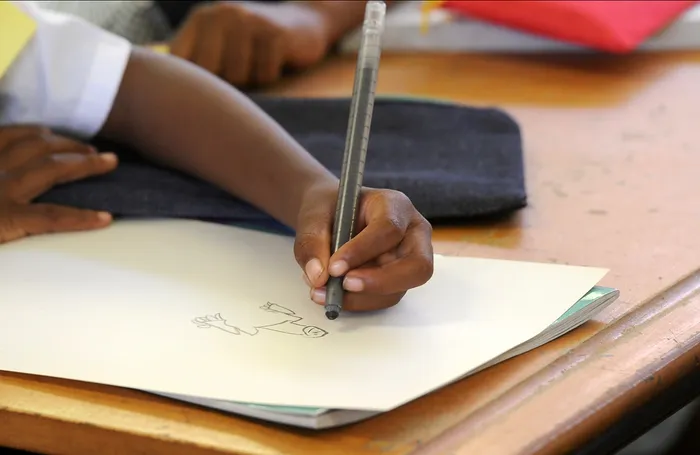
The 2025 PIRLS results reveal that 81% of Grade 4 learners cannot read for meaning, says the author.
Image: File Karen Sandison/ Independent Media
In South Africa, the bitter irony of education is that a certificate often signals neither mastery nor mobility. Each year, thousands of matriculants emerge from underfunded schools with qualifications that cannot secure them work or dignity.
The OECD reports that nearly 39% of young South Africans with secondary schooling remain unemployed, a reality that mocks the promise of liberation. Three decades ago, economist Thomas Sowell exposed the deceptions of American education: grade inflation, union dominance and ideological capture that prized access over competence. South Africa today represents an even harsher version of those illusions.
Our system, celebrated for mass access, hides a deeper truth: access without outcomes chains the poor more tightly than exclusion. What appears as misfortune is, on closer inspection, a careful orchestration of incentives and neglect. From apartheid’s deliberate miseducation to democratic South Africa’s emphasis on symbolic transformation, education has often been wielded as a political instrument rather than a liberator.
To interrogate this deception, we must look beyond statistics into the incentives, histories and philosophies that sustain mediocrity. Only then can education be reclaimed as a tool for emancipation, not dependency. South Africa’s education system carries the legacies of two powerful forces: apartheid’s engineered underdevelopment and post-1994 initiatives that blurred the line between access and quality. Mergers of colleges, diluted standards and a pass threshold of 30% created a mirage of progress while leaving foundational skills unattended. The data is unforgiving.
The 2025 PIRLS results reveal that 81% of Grade 4 learners cannot read for meaning. Media Monitoring Africa reports that 96% of public schools are overcrowded, while teacher absenteeism hovers at 10–15%. World Bank data confirms a real-term decline in per-learner education spending. Tertiary outcomes mirror these failures: over 42% of secondary graduates remain unemployed and nearly half of university entrants drop out in their first year. The department has announced pilots to integrate AI in classrooms and pledged to expand Technical and Vocational Education and Training (TET) colleges, with curriculum reviews underway. These initiatives signal intent but remain largely aspirational.
Technology cannot teach a child who cannot read, nor can expanded pipelines rescue students unprepared by weak foundations. Without confronting incentives, standards and accountability, these efforts risk becoming symbolic interventions rather than substantive progress. Lowered thresholds are not acts of mercy but deferred responsibility. They produce graduates unprepared for the labour market, while many families seek private or overseas education alternatives.
The consequence is a growing cohort of young South Africans struggling to access meaningful opportunities. Beneath the surface of South Africa’s schools lies a landscape of misaligned incentives, who thrives, who falters and what realities are conveniently overlooked. Structural incentives reward institutional survival and political visibility over genuine educational outcomes. Protections that shield underperformance alongside policies that prioritise enrolment over achievement reinforce short-term legitimacy while masking deeper failures. The real cost falls on learners, many of whom leave school unprepared for work or higher education. Symbolic measures signal transformation yet conceal persistent gaps in competence and opportunity.
South Africa spends roughly R58 000 per learner per year, lower than OECD averages but not negligible. Yet outcomes lag dramatically. Literacy gaps persist, infrastructure crumbles and dropout rates soar. Mother-tongue education remains neglected, undermining comprehension and cultural confidence alike. Education systems risk indoctrination when ideology replaces practical learning. Curricula often prioritise politicised narratives over mathematics, science and entrepreneurship. Indoctrination is not transformation; it is entrapment.
Honest measurement is missing from public debate. Grade inflation, low pass marks and manipulated statistics obscure the scale of failure, leaving many with certificates but limited competence. This crisis did not emerge overnight. Its roots extend decades back, and the question is not only how it took hold but why solutions remain elusive. Apartheid engineered underdevelopment; post-apartheid initiatives preserved structural inertia. In the mid-1990s, technikon and college mergers diluted vocational training. Policies emphasised optics over substance, prioritising access and visibility over foundational learning.
The World Bank has shown that raising basic education quality could lift inclusive growth significantly. Yet structural incentives continue to reward appearances over lasting change. Policies that sound compassionate can, in practice, undermine competence. South Africa faces a reckoning: pursue substantive change or repeat cycles of symbolic interventions. AI pilots, promises of new TET colleges and curriculum reviews may be promising, but cannot substitute for competence. You cannot digitise illiteracy nor pipeline unprepared students into productive programs. Without structural change, these initiatives risk becoming cosmetic. Education is not marginal, it is the bedrock of societal resilience. A nation that cannot produce literate, skilled citizens cedes its future to dependency on imports, elites and aid.
For those with access, education may be outsourced. For the majority, mediocrity is regarded as progress. Redefining success demands more than certificates and enrollment figures, it requires asking how changes can be meaningful, durable and anchored in competence. Adjustment must begin by raising the pass mark, restoring the dignity of achievement. Specialisation should be revived, universities for theory, colleges for practice, and apprenticeships for trades. Accountability must be tied to outcomes, not structural protection or political convenience. The department’s AI ambitions and TET college pipelines could play a role, but only if built on strong foundations. Without basic literacy, technology amplifies inequality.
Without standards, colleges become warehouses of frustration. Change must be structural, not cosmetic. South Africa’s education system is not a product of chance, it is a structure that misleads, pacifies and perpetuates dependency. The statistics confirm it, but the philosophy explains it: mediocrity as control. Deception flourishes where meaningful accountability and standards are absent. Our task is to expose illusions, strengthen educational outcomes and demand transparency. Young South Africans must not be used as pawns. Compete for your future and claim the education that liberation promised.

Nomvula Mabuza.
Image: Supplied
Nomvula Zeldah Mabuza is a Risk Governance and Compliance Specialist with extensive experience in strategic risk and industrial operations. She holds a Diploma in Business Management (Accounting) from Brunel University, UK, and is an MBA candidate at Henley Business School, South Africa.
*** The views expressed here do not necessarily represent those of Independent Media or IOL.
BUSINESS REPORT